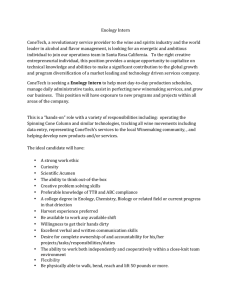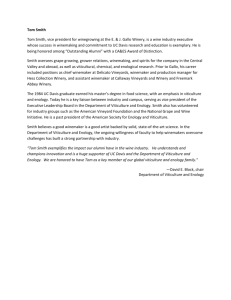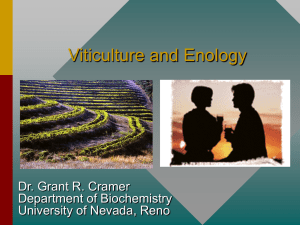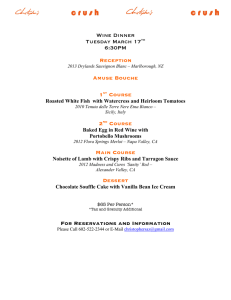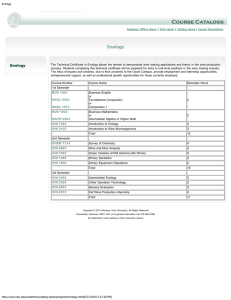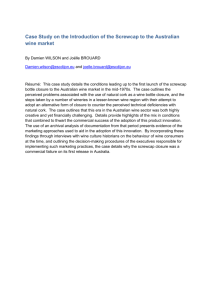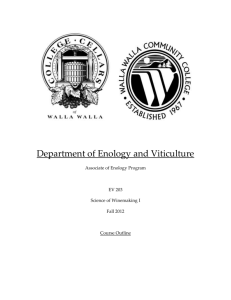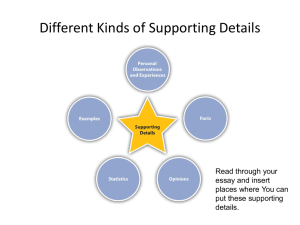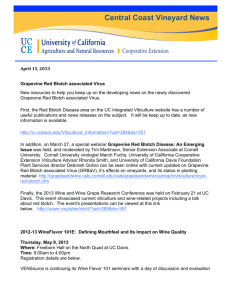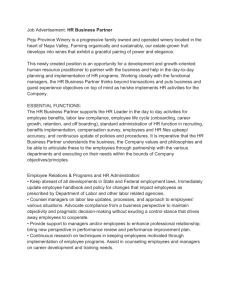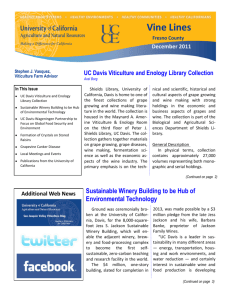Environmental Microbiology-Environmental Engineering Specialist
advertisement
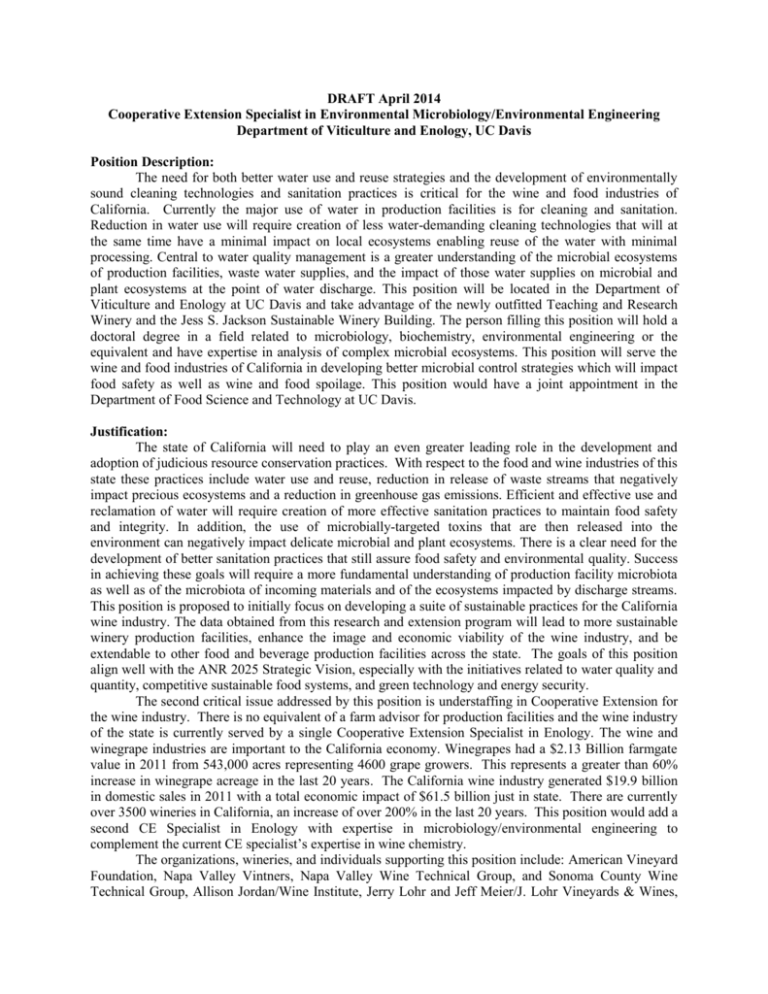
DRAFT April 2014 Cooperative Extension Specialist in Environmental Microbiology/Environmental Engineering Department of Viticulture and Enology, UC Davis Position Description: The need for both better water use and reuse strategies and the development of environmentally sound cleaning technologies and sanitation practices is critical for the wine and food industries of California. Currently the major use of water in production facilities is for cleaning and sanitation. Reduction in water use will require creation of less water-demanding cleaning technologies that will at the same time have a minimal impact on local ecosystems enabling reuse of the water with minimal processing. Central to water quality management is a greater understanding of the microbial ecosystems of production facilities, waste water supplies, and the impact of those water supplies on microbial and plant ecosystems at the point of water discharge. This position will be located in the Department of Viticulture and Enology at UC Davis and take advantage of the newly outfitted Teaching and Research Winery and the Jess S. Jackson Sustainable Winery Building. The person filling this position will hold a doctoral degree in a field related to microbiology, biochemistry, environmental engineering or the equivalent and have expertise in analysis of complex microbial ecosystems. This position will serve the wine and food industries of California in developing better microbial control strategies which will impact food safety as well as wine and food spoilage. This position would have a joint appointment in the Department of Food Science and Technology at UC Davis. Justification: The state of California will need to play an even greater leading role in the development and adoption of judicious resource conservation practices. With respect to the food and wine industries of this state these practices include water use and reuse, reduction in release of waste streams that negatively impact precious ecosystems and a reduction in greenhouse gas emissions. Efficient and effective use and reclamation of water will require creation of more effective sanitation practices to maintain food safety and integrity. In addition, the use of microbially-targeted toxins that are then released into the environment can negatively impact delicate microbial and plant ecosystems. There is a clear need for the development of better sanitation practices that still assure food safety and environmental quality. Success in achieving these goals will require a more fundamental understanding of production facility microbiota as well as of the microbiota of incoming materials and of the ecosystems impacted by discharge streams. This position is proposed to initially focus on developing a suite of sustainable practices for the California wine industry. The data obtained from this research and extension program will lead to more sustainable winery production facilities, enhance the image and economic viability of the wine industry, and be extendable to other food and beverage production facilities across the state. The goals of this position align well with the ANR 2025 Strategic Vision, especially with the initiatives related to water quality and quantity, competitive sustainable food systems, and green technology and energy security. The second critical issue addressed by this position is understaffing in Cooperative Extension for the wine industry. There is no equivalent of a farm advisor for production facilities and the wine industry of the state is currently served by a single Cooperative Extension Specialist in Enology. The wine and winegrape industries are important to the California economy. Winegrapes had a $2.13 Billion farmgate value in 2011 from 543,000 acres representing 4600 grape growers. This represents a greater than 60% increase in winegrape acreage in the last 20 years. The California wine industry generated $19.9 billion in domestic sales in 2011 with a total economic impact of $61.5 billion just in state. There are currently over 3500 wineries in California, an increase of over 200% in the last 20 years. This position would add a second CE Specialist in Enology with expertise in microbiology/environmental engineering to complement the current CE specialist’s expertise in wine chemistry. The organizations, wineries, and individuals supporting this position include: American Vineyard Foundation, Napa Valley Vintners, Napa Valley Wine Technical Group, and Sonoma County Wine Technical Group, Allison Jordan/Wine Institute, Jerry Lohr and Jeff Meier/J. Lohr Vineyards & Wines, Tom Smith/E&J Gallo, Greg Fowler/Constellation Wines, Bruce Cakebread/Cakebread Cellars, and Jeffrey O’Neill/O’Neill Vintners & Distillers. Extension: We would expect the person in this position to create and maintain a vigorous extension program for winery sustainability and to provide statewide leadership in keeping the industry aware of the latest research related to sound sanitation and water use practices. Clientele groups include trade organizations, regional technical groups, and individual wineries that range widely in both size and experience. We would expect the person in this position to offer workshops and short courses in collaboration with faculty in the Department of Viticulture and Enology and with industry practitioners, organize their own symposia and participate in departmental events such as RAVE. Being based in Davis, we would expect them to help transform the Jess S. Jackson Sustainable Winery Building into a magnet for vintners, drawn to see innovative technologies and demonstration projects that will only be seen at this site. Other means to reach clientele will include publications and other web-based tools, such as e-extension. As this person gains seniority, we expect them to take on national leadership in enology extension. Research: Key research areas would include microbial ecosystem profiling of production facilities, vineyards, soils and waterways and the impact of novel environmentally-sensitive cleaning and sanitation practices on these microbial communities. We would expect this research to be published in various electronic and print venues such as California Agriculture, UC/ANR publications on sustainable production and refereed journals such as the American Journal for Enology and Viticulture. ANR and External Network: The person in this position would immediately have a network of research collaborators including faculty ranging from basic to applied scientists in V&E and other departments at Davis, Riverside, and Berkeley. The person in this position would be expected to provide leadership in this network as they progress in their career. A wide array of wine companies, industry organizations and technical groups, and equipment vendors would supply an additional external network. Support: This individual will have office and laboratory space in the Department of Viticulture and Enology, and have full access to the Teaching and Research Winery and the Jess S. Jackson Sustainable Winery Building and the technologies contained therein. It is expected that this individual will have strong input into the selection and design of technologies and systems to be trialed at the Jackson facility. Other support: Research funding sources include the AVF, USDA, CDFA, and NGWI. Location: This position will be located on the UC Davis campus but is expected to have state-wide responsibilities. Developed and Proposed by: Faculty in the Department of Viticulture and Enology (David Block, Chair) have developed this proposal with input from the Department of Food Science and Technology (Michael McCarthy, Chair). External stakeholders consulted and supportive are listed above. 2
